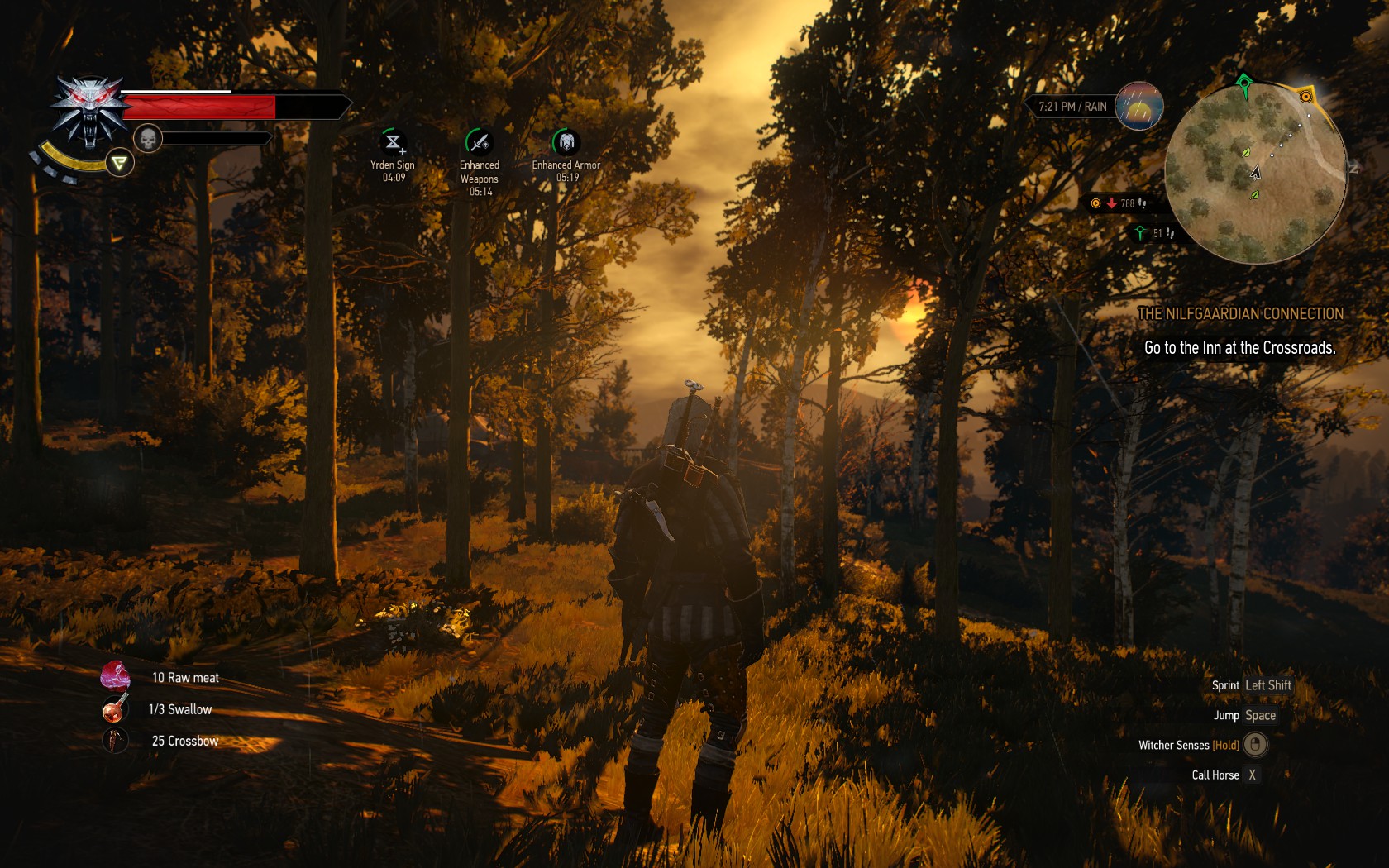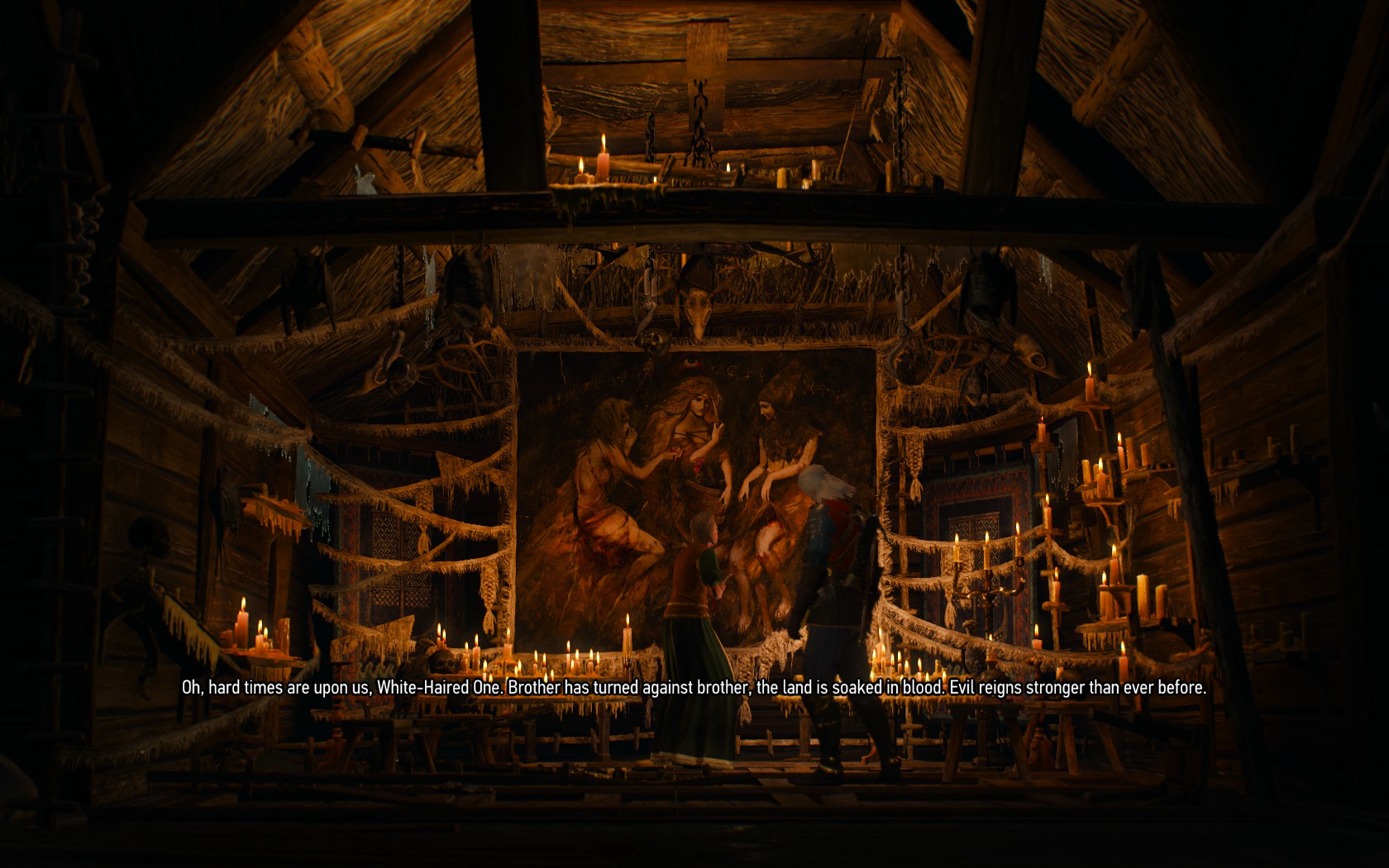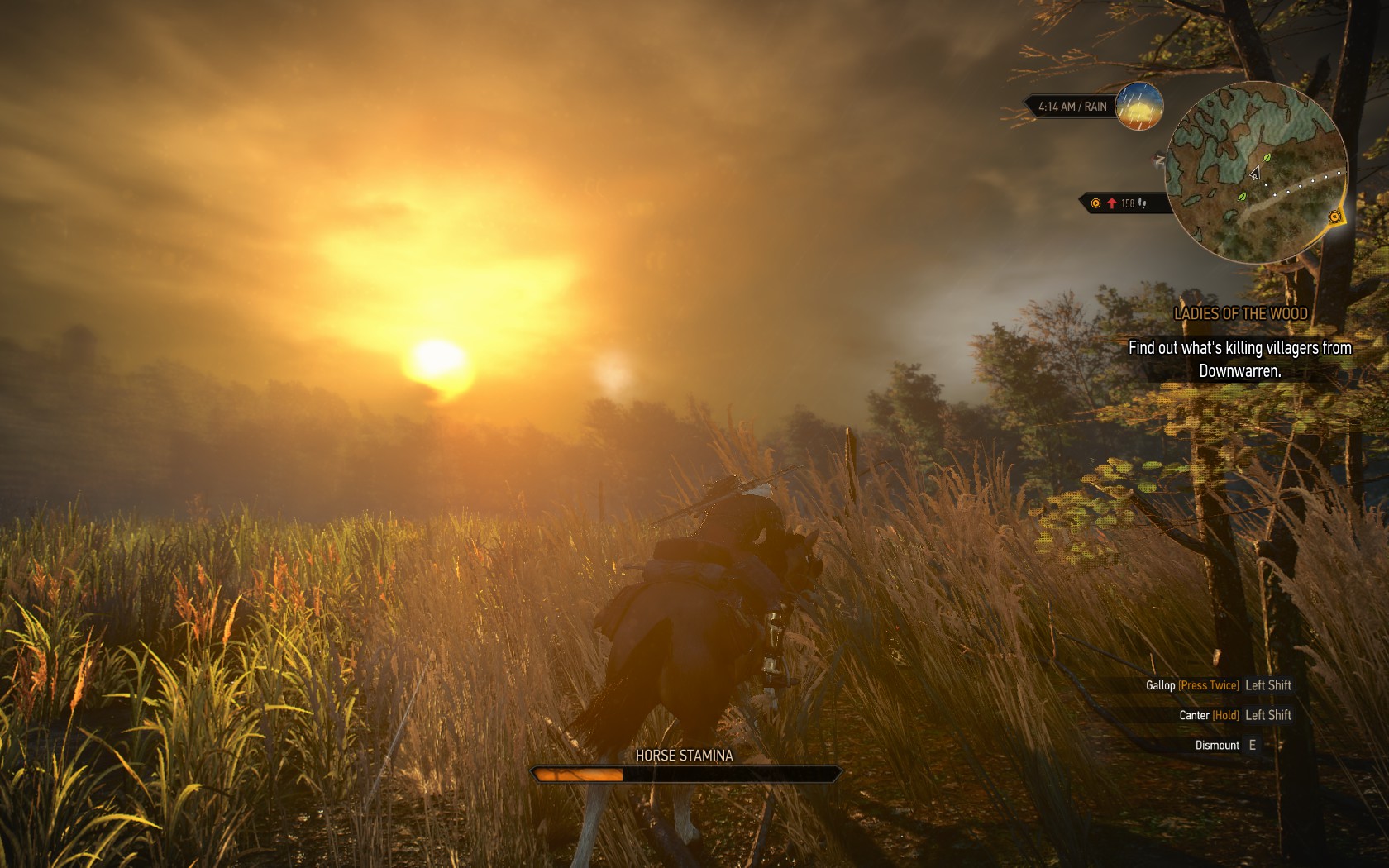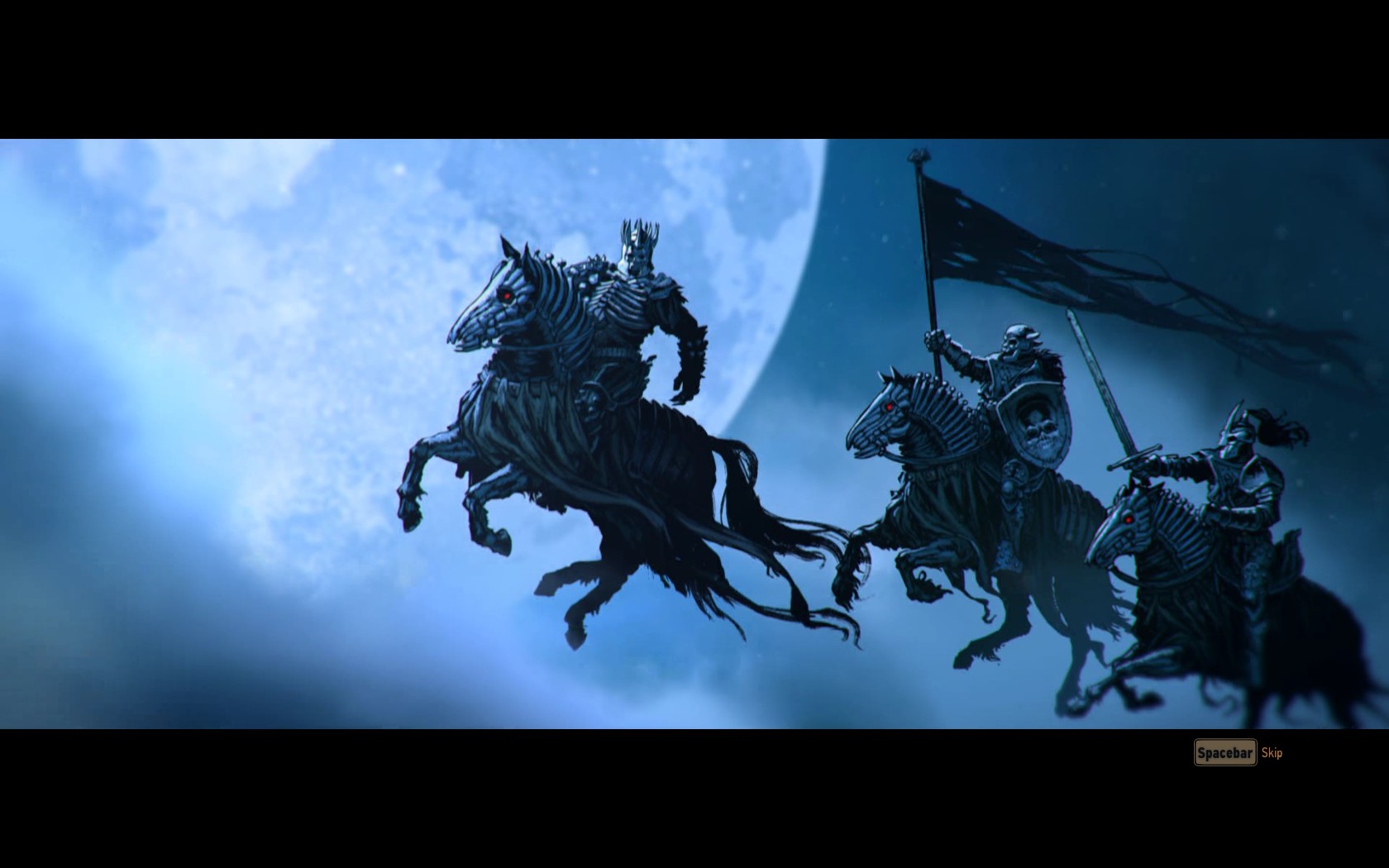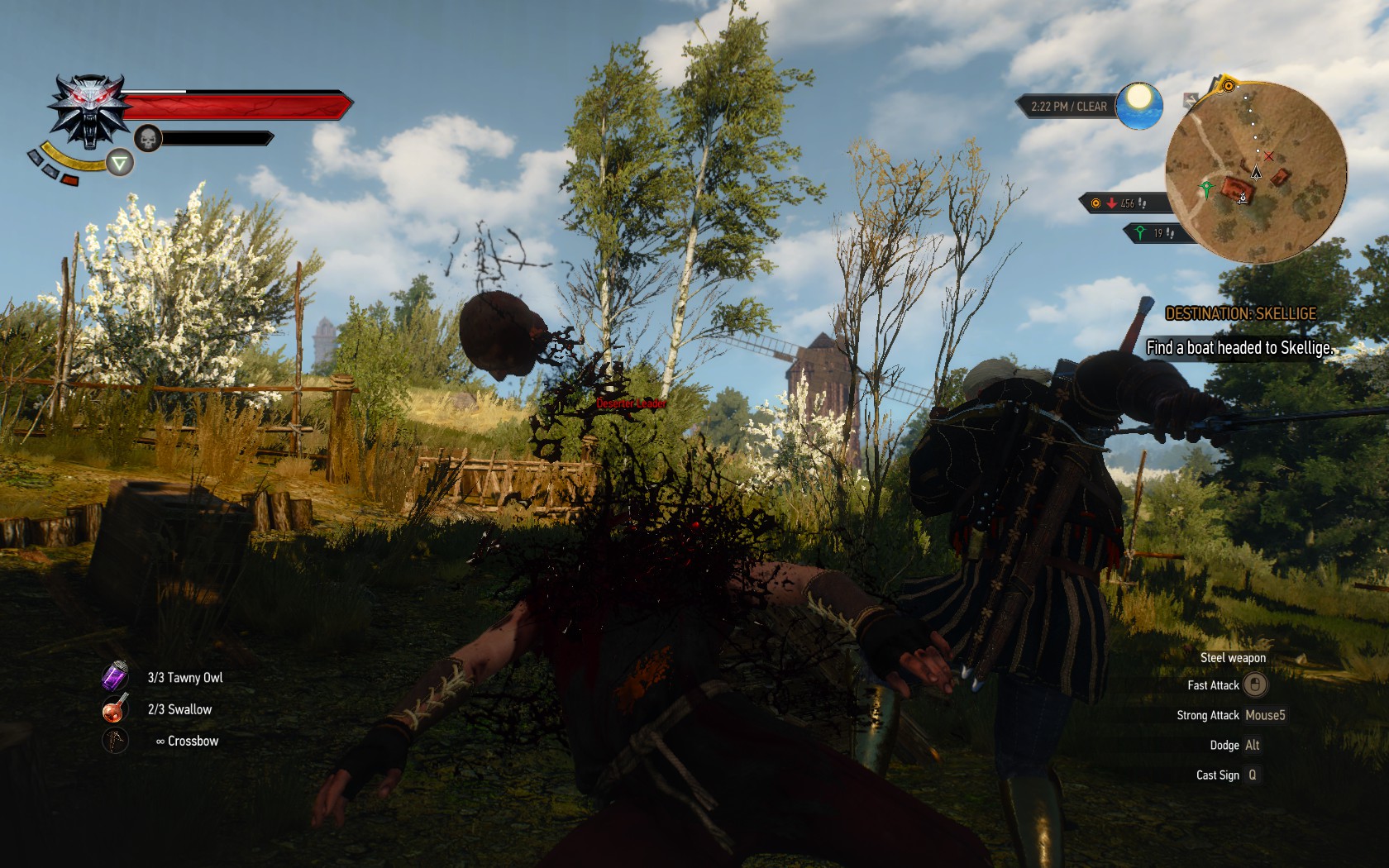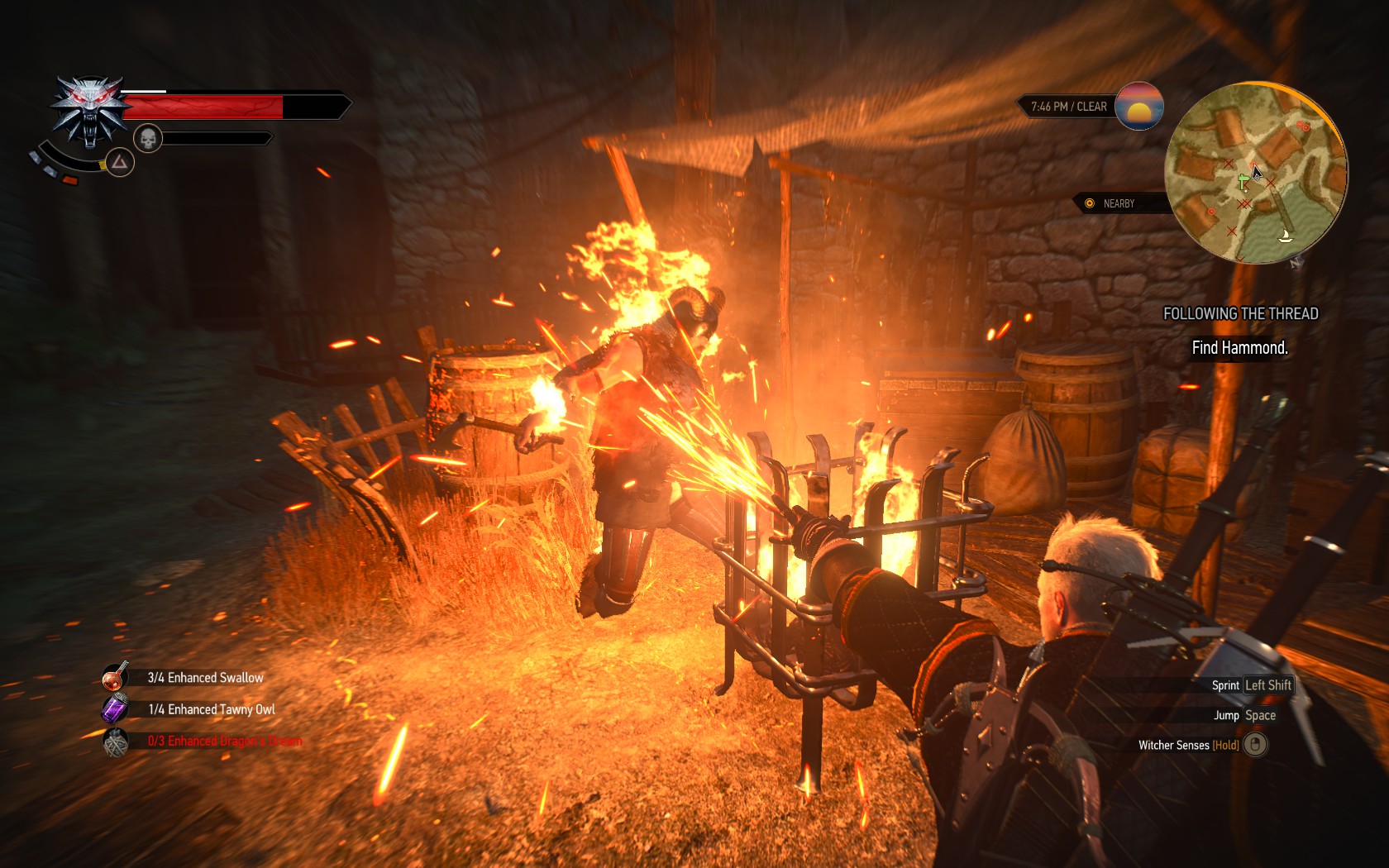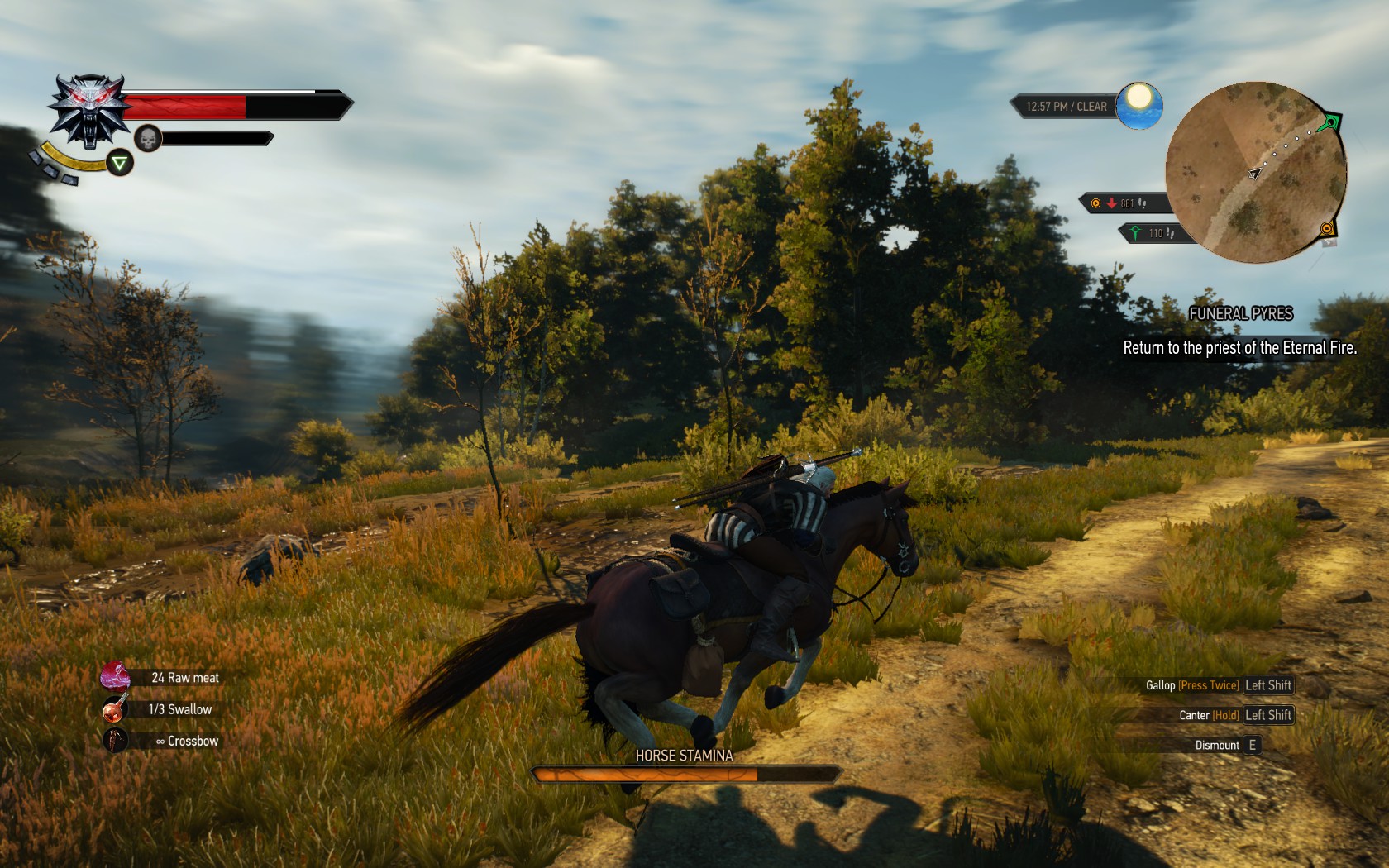This game was reviewed on an i7 Overclocked 4GHZ Quad Core system with 16GB of DDR3 RAM and a GTX 980 GPU. I have tried to avoid as many spoilers as I can by looking at earlier content if possible, however you should expect some story and features to be referenced. All screenshots were taken myself and many chickens were harmed in the making of this review.
All great journeys start somewhere.
I love the journey: from the decision to start the adventure to the first intrepid steps until its final leap towards the ultimate conclusion. This is true to most things in my life but never more so than in games. I remember setting out as a young boy in a game called Another World on my trusty Atari ST. The game was always the same yet I must have walked its path hundreds of times, but why?
Questions like this linger in my mind when I play a game like The Witcher 3 and I start to look at what it is that drives me to play these games again and again. Modern games have become increasingly complex and open; in fact 'open world' is the thing right now and, due to a recent deluge of outstanding open world RPGs, I've been happier than a pig in the proverbial shit. Skyrim and more recently Dragon Age Inquisition have really set the bar for open world RPGs: it now looks like the latest game from CD Projekt Red (CDPR) is poised to push this bar even higher.
So here's my confession: I have never finished either The Witcher or the sequel despite a valiant attempt at each. With games like Mass Effect I would say playing through the entire set is essential because of the linked decision trees and also the game structure is consistent enough through all three. With the first two games in the Witcher series I do feel like the third iteration is a far enough departure to allow new players to just jump right in without wading through the two previous outings. There are a few very well produced videos out there that fully explain the Witcher games and bring new players up to date without having to spend a few weeks slogging through them.
Be watchful of the moon, there be werewolves abroad!
Something old and something new.
Ok so onwards and upwards, what is The Witcher 3 bringing to the table that's unique? Most of all I would say a surprising consistency in content - let me explain. Most RPGs and MMOs I've played follow a similar structure. There's a main plot line which forms the backbone to the story arc and key motivation for your adventure. This is then padded with an array of light side quests and activities which form the bulk of your game time; with the notable exception of Skyrim (where the main story was considerably weaker compared to the remainder of game content). Even in the first few hours of The Witcher 3 I've been extremely impressed with the quality and complexity of the side quests. In one instance I decided to help a man whose daughter had fallen ill due to their well being contaminated; the well itself is also patrolled by a deadly Noon Wraith. What awaited me was a deep and satisfying chapter in its own right: as I crept through the deserted buildings surrounding the well I slowly uncovered the background and anguish that lies at the root of the problem. Geralt helps with this process, his inner dialogue is reflected to you as he ponders his findings and so you learn with him: in essence a subtle tutorial. As it turned out I had already found a piece of the puzzle through being nosey before getting to the well but the game didn't seem to mind. This sequence also teaches you one of the most important Witcher weapons, preparation and knowledge of your prey's weaknesses.
When all is said and done you are a Witcher and the order of business is killing monsters (for a price); as such you have a detailed bestiary which is updated on the fly by new creatures you encounter and vulnerabilities you might exploit should you take the time to do your research. This kind of relationship between the game world and the actions you take gives weight and grounding to the idea that you are a professional monster slayer. As my first fully fledged contract (a very ticked off Griffin) came crashing to the ground I sat back in my chair exhilarated and hungry for more: the truth was this was just a taste of what was to come.
One of the most impressive visual techniques is how trees and foliage catch the light on many layers adding a striking level of depth.
Dancing with Wolves.
Most games will have an obvious weakness but when none are apparent it becomes harder for critics to find something to critique without sounding pernickety. One aspect of The Witcher 3 that has divided opinion is the combat system, some love it and others have called it awful. Once you do delve a little deeper you see that combat is more complex than your first look and it becomes a wonderful, tense and dramatic hurricane of visceral death.
Apart from choosing the right sword (which the game thankfully helps you with) combat is based around a light attack, heavy attack and dodging or leaping out of attacks. You also have your ranged attacks from a crossbow, various bombs and five powerful spells (signs) to unleash. These spells as well as other elements of combat do upgrade and I feel like one with the largest scope for employing varied tactics is the spells. For example, once you have assigned a few points to a shield, it explodes when it collapses, knocking enemies back. On the next tier you get a second function which makes a vitality generating bubble and so on. The Axii sign is also very useful and you can use it to great effect not just in combat also in conversations. Even swordplay improves and gives you abilities such as reflecting arrows back at Archers, a cool feat if your reactions are fast enough. My advice would be this: if you do find combat lacking when you start the game stick with it and wait until it's fleshed out a bit. Some of the upgrades are far more meaty than at first glance. There are other facets of combat too, such as the crossbow, hand crafted bombs and special oils you can apply to your blade, and yet more options that can be deployed against your many foes.
'You can get a cream for that'
If I'm honest I prefer the more fast paced and brutal combat in the Shadow of Mordor, but I also thoroughly enjoy the Witcher's offering. It's like a dance with lots of subtle changes to the basic steps but the most important element is the feeling of true awe which they provoke. Even fights with bears leave your heart pounding and palms sweaty - these creatures look powerful, dangerous and not a single fight in SOM gave me the same sense of fear. It's also only fair to say the environments in SOM are bare and barren compared to those here, so yes, on occasion objects get in the way and the game isn't as snappy when climbing over things but when you consider the mind blowing level of detail and variation in the landscape CDPR can easily be forgiven. If we are going to look beyond the obvious moves and upgrade and instead focus on the overall experience then we have a very special combat system here, albeit not one to everyone's taste.
Give me a reason.
Human beings are a funny old lot - whilst we have huge capacity for intelligent thought we are all too often governed by our emotional palate which can lead to varied levels of success and failure. I think on some level I've always gleaned a good emotional boon from playing games but as they employ more realistic graphics and better world simulation I've found myself being challenged in ways I'm not used to. In short, I love media that provokes emotional reactions in us, not necessarily happy or joyful, but something that kicks my emotional tempo all over the place. Films like Under the Skin or events in Game of Thrones shock me, this in part is what I'm craving from a vast sea of media: something that catches me off guard. As gamers know we have a very exciting advantage over film: we are part of the story and in most cases are intrinsically linked to its conclusion.
Not all stories end well, sometimes choices you make only show their true consequences many days later.
In one side quest I found a lone traveller who had been attacked and lost his cart in the swamps, I felt pity and so offered to help him. This quickly turned to suspicion and intrigue as I discovered signs the traveller hadn't been exactly truthful about how events had transpired. I felt humour as the guy feebly tried to make me look behind myself as he made a bid for freedom and then finally back to pity as I discovered (on knocking him from his horse) that he was in fact an agent trying to gather medical supplies for his wounded comrades. The choice was left to me and so I decided to let him live: a choice like so many others that has an effect later in the game. So there's a decision to be made, nothing new there but it's the emotional tapestry the game weaves around it that makes these decisions worth the time to decide.
The main protagonist of the game is of course Geralt of Riva, a Witcher and professional monster hunter who has undergone many physical mutations that make him a deadly combatant. CDPR could have just used a cut and copy brooding hero type for Geralt and in one sense this would have worked just fine. However, it's the fact that Geralt is so well developed and expertly written that many of the side quests have an extra dimension. Like for most men, sex is enticing for Geralt and yet he's got an air of gallantry about him. If you cross him he may kill you on the spot, but he also has the capacity to show mercy on some of the sorry characters you come across. It's in this way that Geralt maintains his own strong presence but at the same time remained malleable enough to allow the player to cut a unique path through the world.
The art team at CDPR deserve an award for the world they have created, there are sights to behold at every turn.
Like in life, sometimes in games you do things because you find them fun, sometimes you need to do the mundane stuff to get to the fun (MMOs I'm looking at you!). However the best situation is when you have an activity that lends itself to both, situations that while fun in their own right are also checking off that list of tasks you need to do, kinda like doing your grocery shopping on a quad or getting rid of ants with a flamethrower. This is another area where The Witcher seems to shine consistently. Everything from the stunning environments, broad crafting systems and enjoyable exploration are all constantly throwing new experiences your way: this all adds up to a wonderful and ever-changing set of experiences that ensure you rarely grow tired of adventuring - which is a good job considering there are hundreds of hours of gameplay just in the base game, not including the substantial DLC that is in the post.
Objects of desire
Who doesn't like stuff? Nobody I tell you, everyone loves getting stuff and anyone who says otherwise is a liar. The abundance of things to collect became apparent even after killing the first few monsters and looking in my first container. Tongues, brains, meat, pelts, eyes, claws. . . you really do start to feel like a well trained butcher. Containers are everywhere from deserted camps, sunken chests, long dead warriors and of course when you're rifling though the possessions of the many households you visit. I don't think I'm alone here when I say loot (or finding it) is one of my favorite aspects about RPGs and in The Witcher 3 we have been spoilt rotten. It is strange that people are usually happy for you to enter their abode and just snaffle whatever you wish - this is one area I wish was a little tighter, like in Skyrim where NPCs use line of sight to stop your thieving antics.
Within a few hours of play I was feeling very overwhelmed; the sheer diversity of objects is extremely impressive and this is most obvious when examining your alchemy ingredients - it takes many more hours of play before a few of these items start to look familiar. I personally like this in a game, one that is so intense, deep and complex you stand in confusticated awe and, while initially you do feel lost, when it does start to make sense and the items start to click its intensely satisfying. I would say the inventory has started to drive me a little mad, mainly due to the way I have to navigate to my blade oils and bombs every time I wish to use them. There are two quick key slots that offer some speed but I do feel this shortcoming is a throwback from a game designed with controllers taking priority. I look forward to a mod that gives a more PC-centric inventory system and maybe even having containers within my bags to keep letters and books in one place.
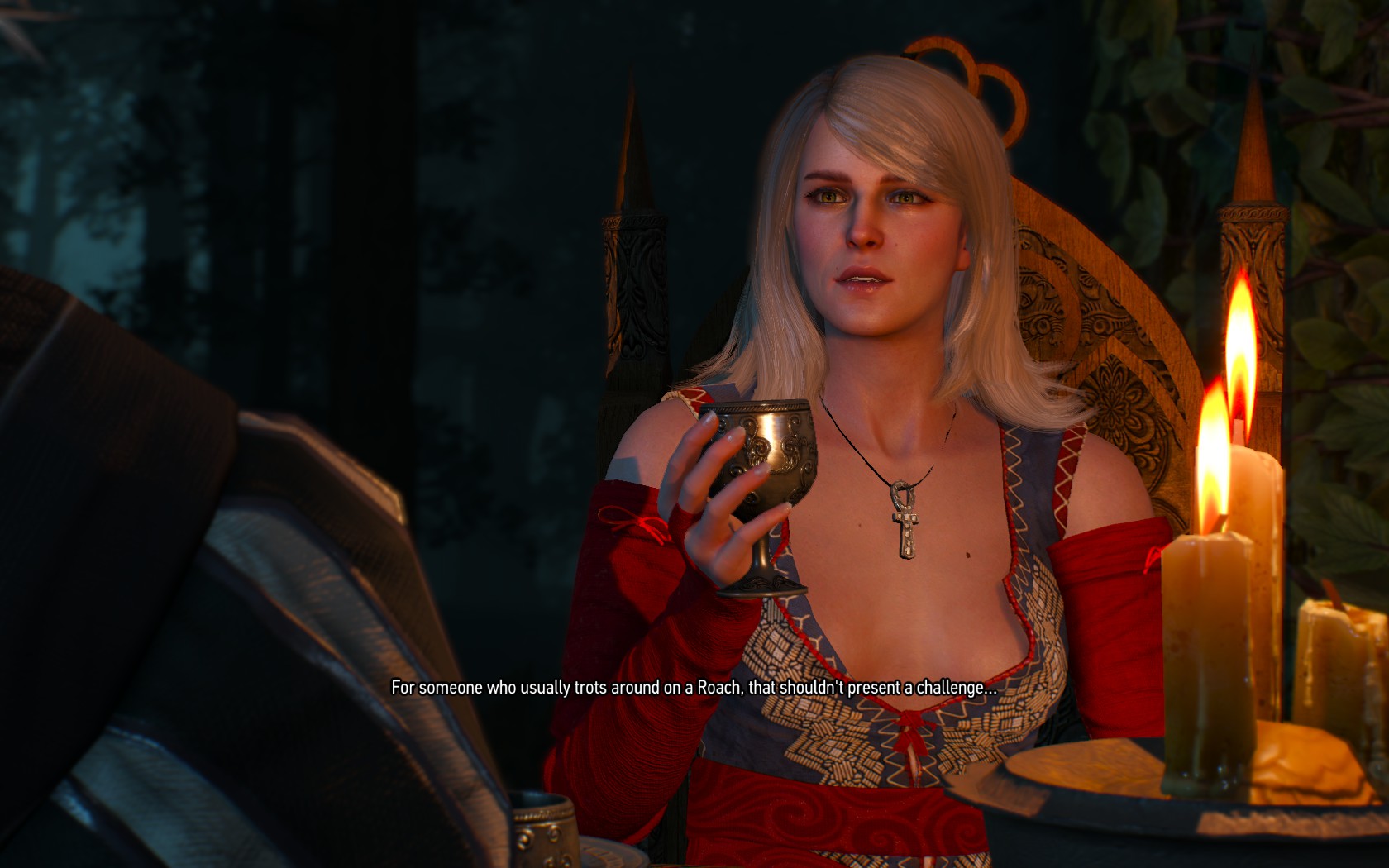
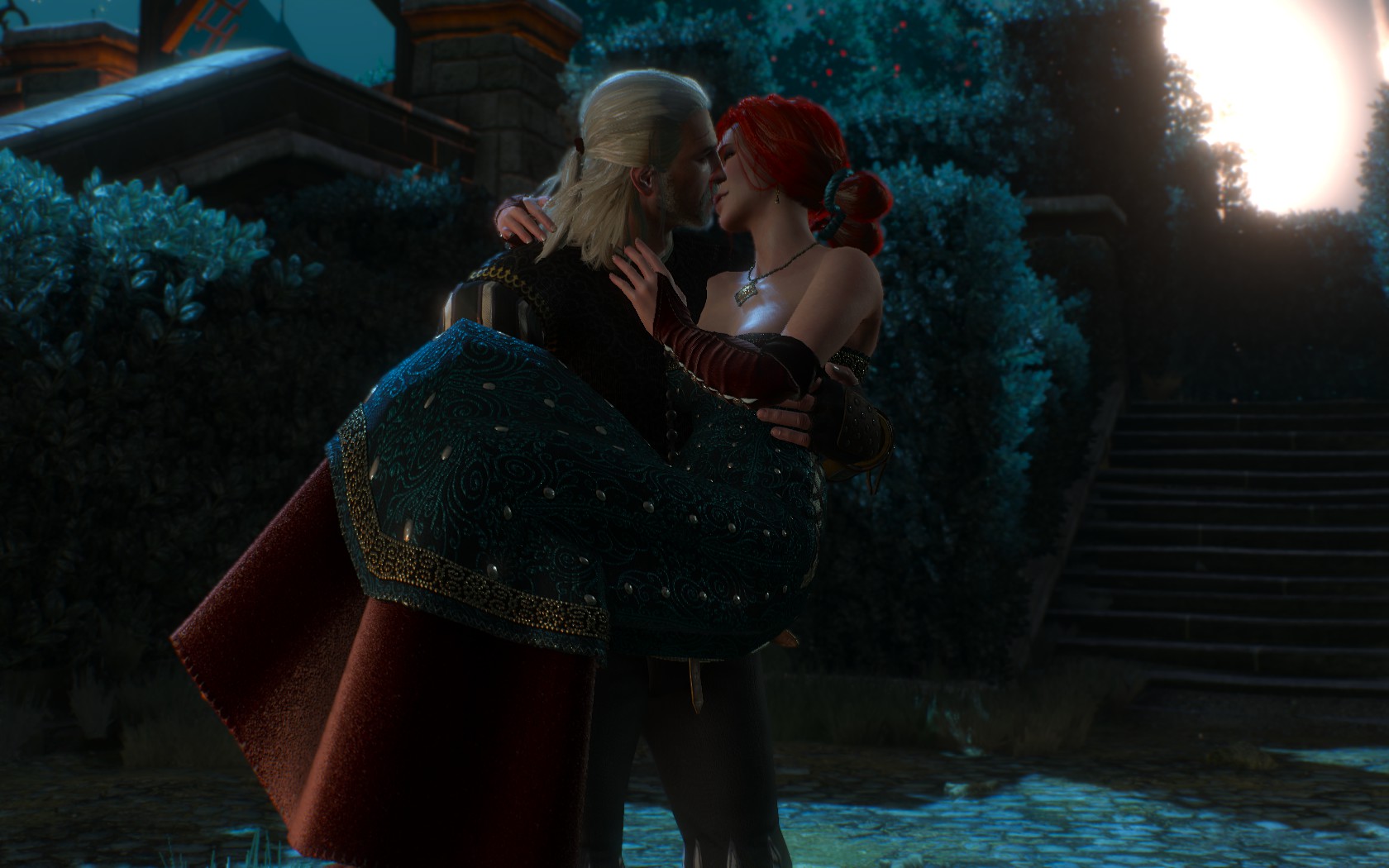
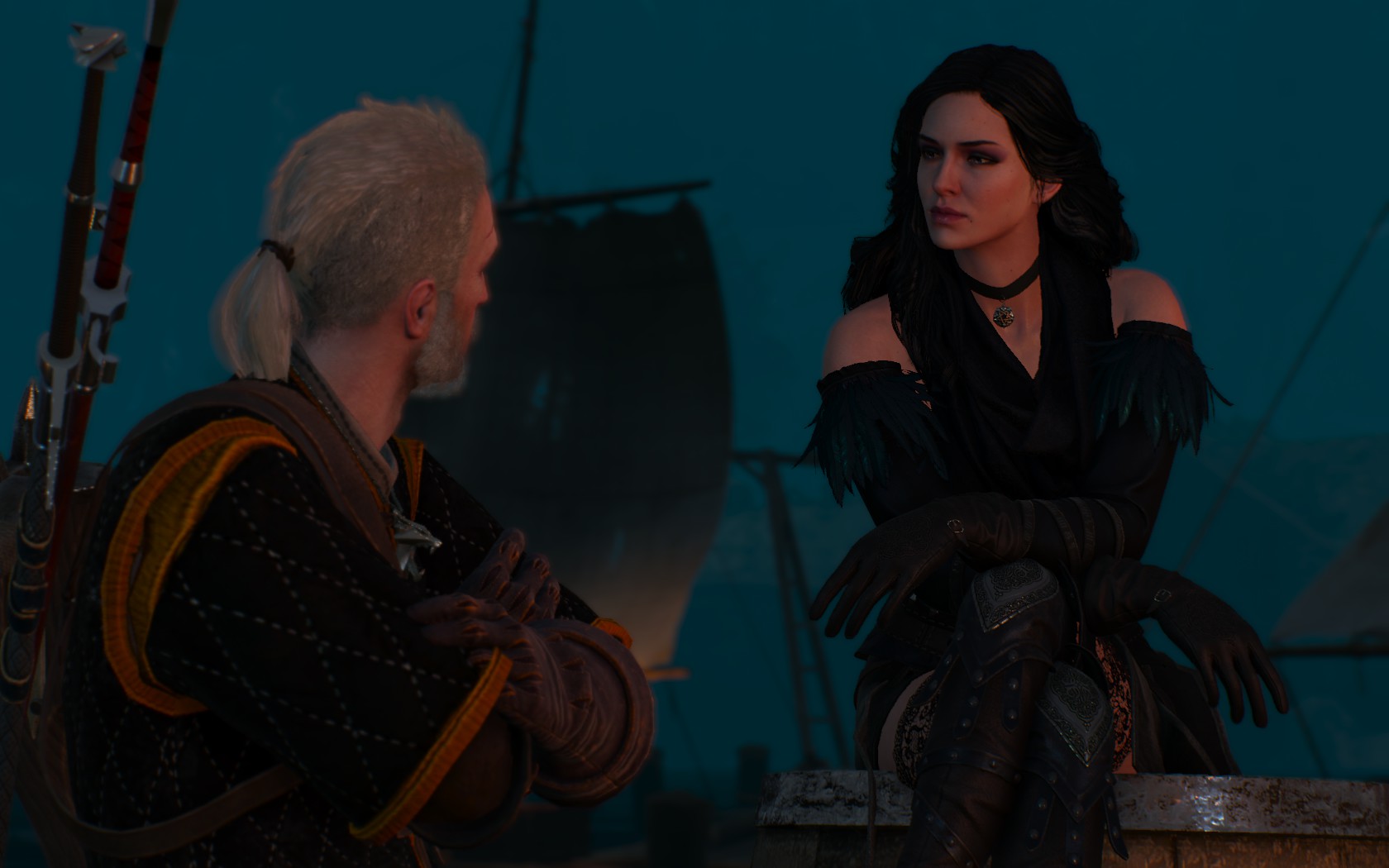
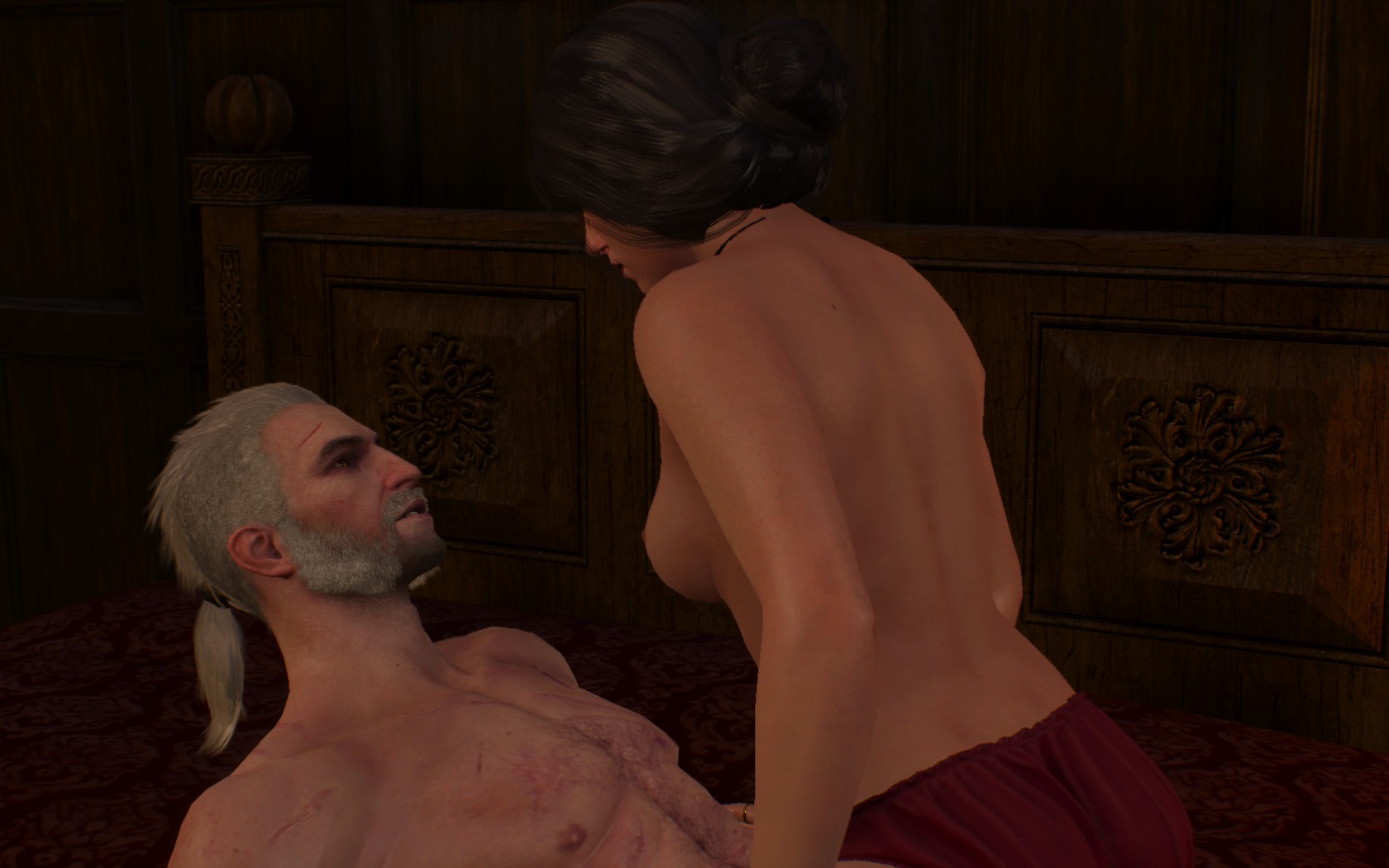
“It’s getting common for games to include sexual relationships, The Witcher 3 does a wonderful job of weaving these into (mostly) meaningful and complex encounters.”
She's a looker.
For years I would argue that gameplay trumps graphics every time and without the former you might as well be doing something else. Some of the best games of all time had little in the graphics department (Xcom springs to mind) but my argument isn't as clear cut any more. Sure, I still think (good) gameplay is very important, but more and more we see these beautifully realised worlds where the sheer spectacle of the environment is a tangible element as to why I enjoy the game. I still hold to the idea that I need to be able to grab hold of it or walk on it (unlike the unreachable skybox you see in Destiny), so seeing the world of the Witcher unfold before your eyes is a sensory treat that pushes the envelope in how game visuals affect the player. The mist rolling through the low hills in the early morning, the late afternoon sun cutting through the tree line and the day/night cycle is sublime. Elements like fire and spells rip through your screens pixels, trees bend in the wind and as dark clouds approach you can almost feel the electricity in the air. The sun I want to mention especially: holy mother of god! - I've never seen dawn or the setting sun look this exquisite, where I actually get a shiver down my spine and just stop for a few minutes taking it all in. This is exciting to me, because for the first time we are seeing visuals that fire the same buttons in my brain as when I enjoy a real sunset, yes the line between graphics and gameplay has never been more frayed.
There is something that you cannot get across with screenshots and that is seeing the game world moving - it's here that for me The Witcher 3 really hits the turbo. It's a moving tapestry that forms one of the most realistic and authentic game worlds I've ever seen. Humans, animals and monsters alike are all beautifully animated; the land is gritty, burned by conflict, and makes you feel like you're grounded in the dirt rather than skipping over the top. The world is also teeming with life from wild deer bolting on sight of you, to rabbits and flocks of birds. Towns and villages also feel alive, people chewing the fat, geese getting pissed off with anything in their immediate vicinity and children playing in the street. Again what makes all this feel real is that you can reach out and change things: you can wallop into people and knock them reeling when on your mount for example. If I fire my a shock wave (Arrd) at a firesource it goes out and I can then light it again with my fire sign: this includes many things from candles, fireplaces and even enemies. You also see the world reacting to specific conditions: in one small settlement I was passing through I heard a voice from inside a shack complaining they had just sent grandpa out to gather fire wood - this was because it had just started raining. As the wind picks up you can see it blowing flags, washing on lines and wooden signs on chains in the village square. This is not objects having preset states; it's a dynamic, robust game world and the well designed systems that occupy it.
Yes if we're being honest some areas of the game are average looking: while I'm thrilled that underwater exploration features so heavily, the underwater visuals could have been better as there are some huge parts of the map covered in water. It's not that they're bad, just they don't look as good as the rest of the game or feel as rich in life. A few more unique rocks and plants would go a long way to sorting this out. With this said, the water in the game does serve to enhance the game a great deal: from secret underwater cave tunnels to being out in a sea storm in all its powerful glory. One element which has me baffled is how on earth the crossbow works underwater - I can't help but feel that the water based combat was either rushed in or cut due to time constraints. With such an ambitious undertaking you'd have to give CDPR a bit of respect and also I would say time to fix bugs that crop up. Their game has had huge critical acclaim and so with such scrutiny and exposure you can be sure every little blemish and wart will have its place on the net. I guess sometimes games become a victim of their own hype and success.
It's a kind of magic!
Games within games have always been intriguing to me: I loved the arcade games in Duke Nukem 3D (if you're old enough to remember that one) and while they weren't very good it added some light-hearted fun to the mix. As a casual Magic the Gathering player and more recently Hearthstone I was delighted to learn that The Witcher 3 has a similar card game build in. Here's the surprise - it's actually pretty damn good. If I had to call it, I would say the previous two games I've mentioned have the edge over Gwent; if for nothing else because there is just a bit more to them in terms of mechanics and scale. So why is it then that I find myself hopelessly addicted and playing Gwent with everyone I can find?
I've been pondering this and so here's my theory: where Magic and HS are housed in a card game Gwent is grounded firmly in one of the best RPGs ever made. Its walls don't just stretch to the edge of the card game, it's actually going on inside a far bigger canvas and so when I win a special card from the Bloody Baron or pick up a special character card from the game this is grounded in the wider universe of the Witcher. I'm not sure if that makes any sense apart from in my own head but there it is. I've seen a few articles on the net claiming Gwent is in fact better than Hearthstone -maybe it might see a release into an actual card game?
Let's get PC.
Looking at what the PC version of the game does right, what it gets wrong and also anything unique about this version will be an integral part of my reviews. I'll get the negative out of the way first and that is the 'downgrade' as it has been dubbed. The game has been demoed in various states, the first time in a jaw dropping trailer in 2013. Based on this trailer many gamers were instantly onboard due to the groundbreaking visuals and level of detail in the game environment. The rub is that there is a substantial visual difference between this gameplay trailer and the product we booted up on the 19th of May. Many fans have picked up their pitchforks and taken to social media/forums complaining to CDPR: the main culprit of the perceived downgrade is that the console versions have held it back due to their own technical limitations.
This issue is a whole article in itself so I'll just say that I can see things from both sides. If the fans see a trailer of gameplay then I believe the developer should make sure it's close to what people will get for their cash. If it's a mock up (vertical slice) or heavily polished version then they really should spell that out to people watching it. One of the devs has come out post launch and said the 2013 trailer was kinda like a perfect view of the game with all the best settings, post processing and polish - ok that's fine but tell that to people because if you just run the clip people are quiet within their rights to expect something at that level or better. I don't believe that saying to people who feel duped 'well, you should know by now it will never look like that' is good enough and it leads to the backlash we've seen. With that said, I do not believe for one second CDPR set out to mislead people in any way, they are one of the best developers out there and have also taken an open stance against companies like Ubisoft and EA with their greedy and manipulative DLC tactics. They have also made a very valid point that The Witcher 3 would never have existed if not for the money from console sales; something to think about.
So what happens when the PC community love a game but find they are not happy with something? They mod it of course. The PC modders for me represent one of the best aspects of the platform, it is the embodiment of creativity and personality that runs through the very DNA of PC gaming. Already we are seeing some good mods appearing for The Witcher 3 and as it's a single player experience like Skyrim there is nothing holding modders back from creating anything they wish and some of course have already pledged to make the game look as good as the E3 2013 demo: let's hope they pull it off.
As for PC-specific problems I have not seen anything major myself; as usual instances of problems are higher on PC due to the massive range of hardware the game runs on. Sure I've had the odd crash or bug but nothing too stressful. There have been save game problems on all platforms thankfully these seem to be getting sorted. The one feature that has seen plenty of attention is the NVidia specific feature called Hairworks. This renders individual strands of hair and when it works looks awesome. However so far it's been killing frame rates on most machines - I lasted three days before turning mine off and the jump in FPS was very noticeable. CDPR have been rolling out new patches which have been squashing bugs and adding new features: again, they display a fantastic attitude towards their fans and customers. So how does the PC version look compared to other platforms?
As you would expect PC is the best looking version, with better textures, blistering frame rates and well, just a bit more of everything really. I think the PS4 version is the closest in looks but there really isn't much in it. From what I've seen on videos the consoles are holding their own and apart from big frame rate drops the game looks great across all platforms. What is becoming a growing trend is the exciting addition of 4K support right out of the box. Right now 4K gaming is at the bleeding edge of what a good top notch PC can handle. However it's extremely exciting to know that when I upgrade in a few years to a (no doubt far cheaper) 4K monitor and system to run it I will be able to see new life breathed into the Witcher yet again.
Summary
No matter how good a game is when it hits the public arena there will always be people who don't like it and this is just the way of things, it would be a pretty boring place if we all thought the same way. However, overall the consensus seems to be that The Witcher 3 is one of the best RPGs ever made. What makes this even sweeter is that it's from such a good developer who are clearly invested in the gamers as well as paying the bills, not all developers can claim the same.
New games come and new games go, usually employing the same old blueprints but with a few unique bells and whistles. Every so often a game comes our way that not only pushes the genre into uncharted waters but also raises the bar in terms of sheer scale and quality. CD Projekt Red deserve very high praise for what they have accomplished in The Witcher 3 and I would love to thank them for giving us such an astounding game to explore and get lost in. I've been playing for over two weeks now and the really exciting thing is that I know I've only scratched the surface. With so many meaningful choices and varied conclusions to my adventure I suspect I'll be roaming the world of the Witcher for many years to come.


